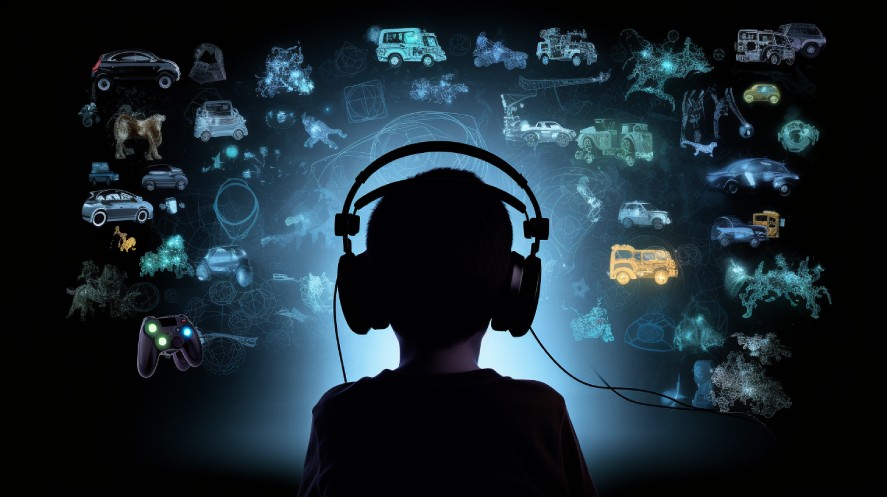Gaming is now a massive part of people’s everyday lives!
Whether gaming on a console, computer, or mobile device, video games provide an exciting break from reality. Players can dive into virtual worlds, go on adventures, and compete against others.
However, playing video games can be a fun and pleasant hobby. Nonetheless, it’s crucial to consider the hazards of becoming addicted to gaming.
What is Video Game Addiction?
Video game addiction, also known as gaming addiction, is a behavioral addiction that involves excessive use of video games to the point where it interferes with daily life.
Gamers who are addicted often have an intense urge to play and find it hard to stop, even if they face negative consequences like poor school or work performance, loneliness, or health issues.
Online Gaming Addiction
Online gaming addiction is a specific subcategory of video game addiction. It refers to the excessive use of online games such as massively multiplayer online role-playing games (MMORPGs) and first-person shooters (FPS).

Online gaming addiction can be a problem because it’s tough to stop playing the game. That’s especially true because of all the social and competitive parts of gaming.
Video Game Addiction Statistics
Gaming addiction statistics are always worth concerning. According to Dr. Douglas’ study:
- About 1 in 10 American teenagers have a video game addiction.
- The prevalence of teenage video game addiction ranges from 7.9-19.8%, depending on the criteria used for scoring.
- 11.9% of boys are addicted to video games. While this rate is only 2.9% for girls.
Gaming Addiction in Adults
Recent studies have shown that adults are just as susceptible to gaming addiction as teenagers, and video game addiction in young adults is a real deal.
- In the US, 66% of individuals engage in video gaming, and the average player is 35.
- 46% of gamers in the US are female.
- 163 million adults in the US play video games.
But what about gaming addiction in the workplace? Surely, adults should be able to control their gaming habits when it comes to their job.
Unfortunately, this is not always the case. As more and more jobs require the use of computers and other technology, gaming addiction in the workplace is becoming an increasingly pressing issue.
Video Game Addiction in Teens
Gaming addiction is a growing concern worldwide, particularly for teens who are more susceptible to addiction due to their still-developing brains.
- Over 19% of males and 7.8% of females demonstrate signs of gaming disorder.
- 10% of teens with gaming addiction symptoms have worsened over time, while 18% with moderate symptoms have remained consistent.
- Additionally, 12% of Canadian students have shown symptoms of a video game addiction.
Gaming addiction affects teenagers’ health and their academic performance, social life, and future career prospects. That’s why it’s crucial to raise awareness about the risks of gaming addiction and provide support for those who need it.
Gaming Addiction in Children
The rise of video gaming among children has become a cause for concern due to the potential for gaming addiction. A recent study shows some gaming addiction facts:
- 51 million kids in America play video games.
- In Singapore, an estimated 10% of children are addicted to gaming and the internet.
- South Korea has declared gaming disorder a public health emergency, with over 600,000 children affected.
- Of all gaming addicts, 11-12% are boys, and 6-7% are girls.
How Many Gamers Are There in the World
According to The Recovery Village, more than 3.2 billion people play video games globally. And the World Health Organization reports that up to 3% of video game players have an addiction.
What Nation Has the Highest Per Capita Ratio for Video Game Addiction Users
The Korea Gaming Addiction Association estimates that around 11 million people in South Korea are addicted to video games.
Therefore, South Korea has the highest number of video game addicts per capita (as of 2023). This means around 41% of people are affected by this issue.
For more information about game statistics, check out our article “Gaming Statistics: How Many Gamers Are There in the World?“.
The Science Behind Video Game Addiction
Video game addiction is becoming a bigger problem, especially for young people. But why are video games so addictive?
One of the key factors is dopamine.
Video games can trigger the release of dopamine, particularly in the brain’s reward centers, making them highly rewarding and reinforcing.
Behavioral reinforcement is also a significant factor in video game addiction.

Certain behaviors, like playing video games, trigger our brains to release dopamine, which reinforces the behavior. Over time, this can lead to a cycle of addiction, where the individual continues to play addicting games to receive dopamine release, even when it becomes detrimental to their health and well-being.
Certain types of games are also more addictive than others. Clicker and idle games, for example, are designed to be highly engaging and rewarding, with constant feedback and rewards for completing tasks. These games can be particularly addictive, with players often spending hours at a time playing them.
Video Game Addiction Signs
Common gaming addiction symptoms include neglecting other responsibilities, such as school, work, or relationships, as well as experiencing withdrawal symptoms when unable to play.
Video Game Addiction and Mental Health
Gaming addiction can harm mental health by causing anxiety, depression, and social isolation. These negative gaming addiction consequences can exacerbate and perpetuate the cycle of addiction, making it harder for individuals to break free and overcome their addiction.
1. Depression
Excessive gaming can cause people to stop enjoying things they used to like, avoid family and friends, and feel hopeless and sad. This can lead to further isolation, which can ultimately worsen the symptoms of depression.
2. Anxiety
Anxiety makes individuals become increasingly nervous or agitated when unable to engage in gaming activities. When we feel overwhelmed, we may become stressed and tense and experience physical symptoms such as headaches, nausea, and difficulty sleeping.
3. Social Isolation
Gamers may spend increasingly longer periods of time alone, foregoing social interactions and opportunities for personal growth and development. This can lead to further feelings of loneliness and despair, exacerbating gaming addiction’s negative mental health effects.
The Social and Economic Costs of Video Game Addiction
One of the most apparent economic costs of video game addiction is decreased productivity.
When someone is spending hours every day playing addicting games, they are likely neglecting other duties or responsibilities that could lead to an increase in their income or overall success.
Secondly, strained relationships can be another factor that impacts people who struggle with video game addiction.

Friends, family members, and loved ones may become concerned by the amount of time and energy that is being poured into gaming instead of spending quality time together.
Finally, video game addiction can significantly negatively impact an individual’s finances.
The cost of purchasing new games or gaming equipment can add up quickly. Those who spend excessive amounts of time playing games may neglect other essential bills or expenses, leading to debt and financial instability.
Risk Factors for Video Game Addiction
The World Health Organization recognizes gaming addiction as a mental health disorder. So, what risk factors make certain individuals more susceptible to video game addiction?
1. Preexisting Mental Health Conditions
People with existing mental conditions like depression, anxiety, or ADHD may be more likely to develop a video game addiction. Playing video games can temporarily relieve these conditions, leading individuals to go gaming more often.
2. Social Isolation
People who are socially isolated or lonely may turn to video games as a form of escape or companionship. This can create a dangerous loop where someone feels alone and gets addicted to try and feel better.
3. Personality Traits
Certain personality characteristics like acting impulsively or lack of self-control have been connected to a higher chance of becoming addicted to gaming.
4. Gaming Addiction Relapse
Gaming addiction, like any other addiction, can include periods of relapse. After someone who has a history of being addicted to games recovers, they might still struggle with wanting to play again.
In addition, the design of some video games can make them more addictive. Games with no end goal or clear stopping point or featuring constant rewards and achievements can be particularly alluring to players.
Video Gaming Addiction Treatments
So, how to stop gaming addiction?
Video gaming addiction treatments can take many forms. Three of the most common video game addiction treatment options are cognitive-behavioral therapy, addiction counseling, and digital detox programs.

In more severe cases, video game addiction rehab centers may be necessary to provide comprehensive care. These facilities specialize in helping individuals overcome their addiction to gaming through various therapies and support systems.
1. Cognitive-behavioral Therapy (CBT)
Gaming addiction therapy is a type of therapy that focuses on changing negative thought patterns and behaviors. This can be effective for video game addiction because it can help individuals to recognize and challenge the thoughts that lead them to play games excessively.
CBT can also help individuals to develop strategies for managing their cravings and avoiding triggers for gaming.
2. Addiction Counseling
This type of gaming addiction help can be done individually or in a group setting. It focuses on helping individuals understand their addiction’s underlying causes and develop new coping strategies on how to prevent gaming addiction.
3. Digital Detox Programs
These programs are specifically designed to help individuals who are struggling with technology addiction, including video game addiction.
These gaming addiction recovery programs typically involve a period of time where individuals disconnect from technology completely, allowing them to re-acclimate to the real world.
4. Other Treatments
Besides the treatment options above, various gaming addiction support resources are available for those struggling with video game addiction. These include gaming addiction hotlines, support groups, and online forums where individuals can connect with others who are going through similar experiences.
If you or someone you know is struggling with video game addiction, seeking video game addiction help is the first step towards recovery. Many online gaming addiction support groups and resources are available to help. They offer helpful guidance on how to overcome the difficult challenges of addiction.
Video game addiction recovery programs are also available, which combine various treatment options to provide a comprehensive approach to overcoming addiction.
Responsible Gaming Practices
Responsible video gaming is about having a mindful approach to gaming habits. It’s about understanding that gaming can be a fun and rewarding hobby but also comes with risks.

1. Understanding the Benefits of Responsible Gaming
Gaming can improve cognitive skills, foster social connections, and provide a sense of achievement and accomplishment.
But these benefits only happen if you play video games in a responsible and healthy way. By practicing responsible gaming, you can enjoy all the benefits of gaming without the negative consequences.
2. Setting Boundaries
One of the most important responsible gaming tips is setting boundaries. This means establishing limits on your gaming time and sticking to those limits.
You can do this by setting a timer or using an app that tracks your screen time. Setting realistic boundaries and communicating them with others is important, especially if you are gaming with friends or family.
3. Taking Breaks
It’s important to take frequent breaks to give your mind and body a rest. This can help prevent eye strain, fatigue, and other negative consequences associated with excessive screen time.
During prolonged periods of sitting, take breaks every hour or so to do something else, like going on a walk, stretching, or reading.
4. Avoiding Excessive Screen Time
To keep it healthy, limit the time you spend staring at screens. This means avoiding gaming late at night, playing for extended periods, and using gaming to escape real-life problems or responsibilities.
5. Developing Positive Gaming Habits
Developing positive gaming habits means adopting a mindful gaming approach and recognizing the potential risks and consequences. It also means engaging in healthy gaming habits, such as playing with friends, taking breaks, and avoiding excessive screen time.
Conclusion
Video game addiction is a big issue that affects people of different ages and backgrounds.
Recognizing the signs of gaming addiction and taking proactive steps to prevent it is important. By knowing the dangers of gaming addiction and taking action to limit them, you can enjoy playing video games while staying in control of your life.
Remember, responsible gaming is the key to a happy and healthy relationship with video games. And that’s how to overcome gaming addiction!
Loading survey...

